Unit 4 Body language-Learning about language
文档属性
| 名称 | Unit 4 Body language-Learning about language |
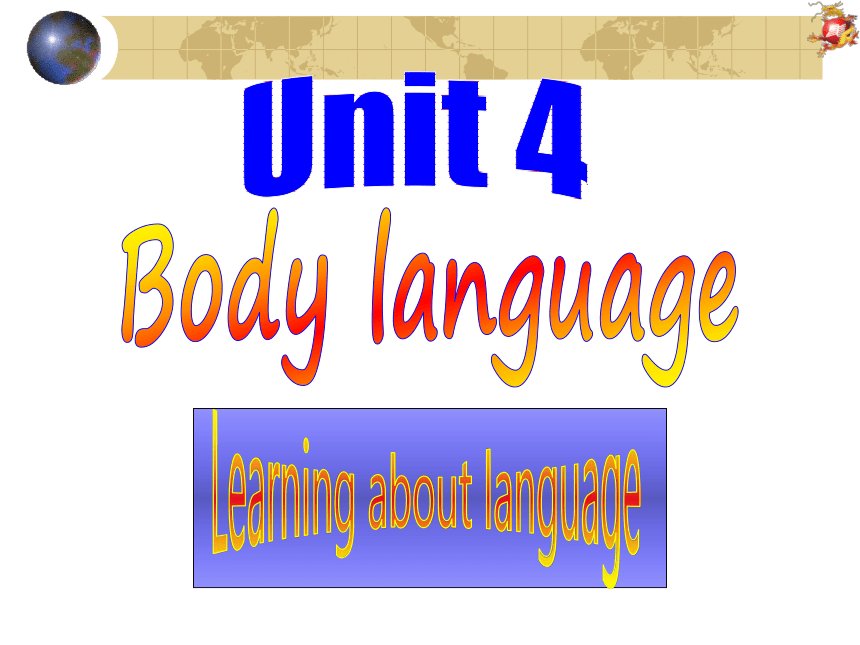
|
|
| 格式 | rar | ||
| 文件大小 | 187.6KB | ||
| 资源类型 | 教案 | ||
| 版本资源 | 人教版(新课程标准) | ||
| 科目 | 英语 | ||
| 更新时间 | 2011-12-09 00:00:00 | ||
图片预览

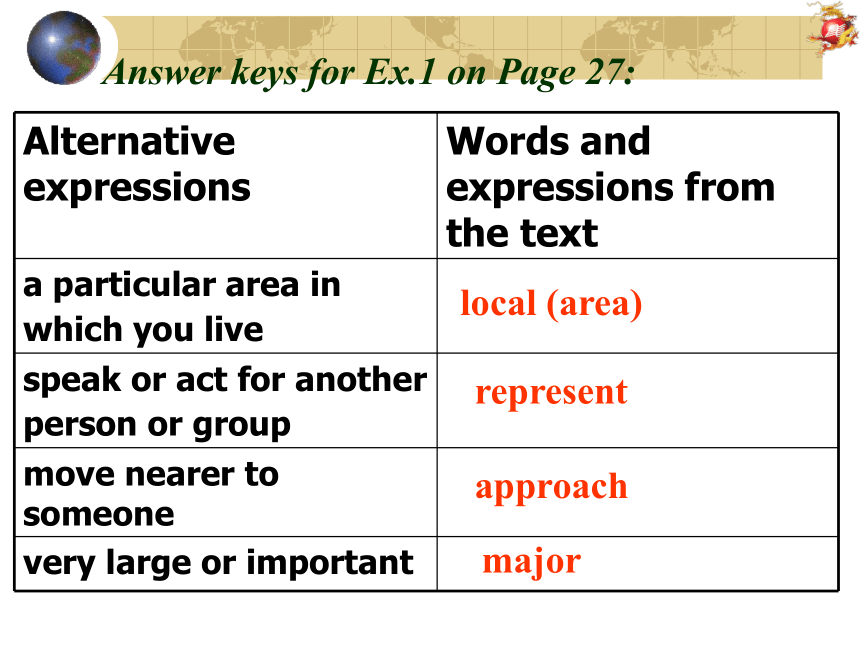
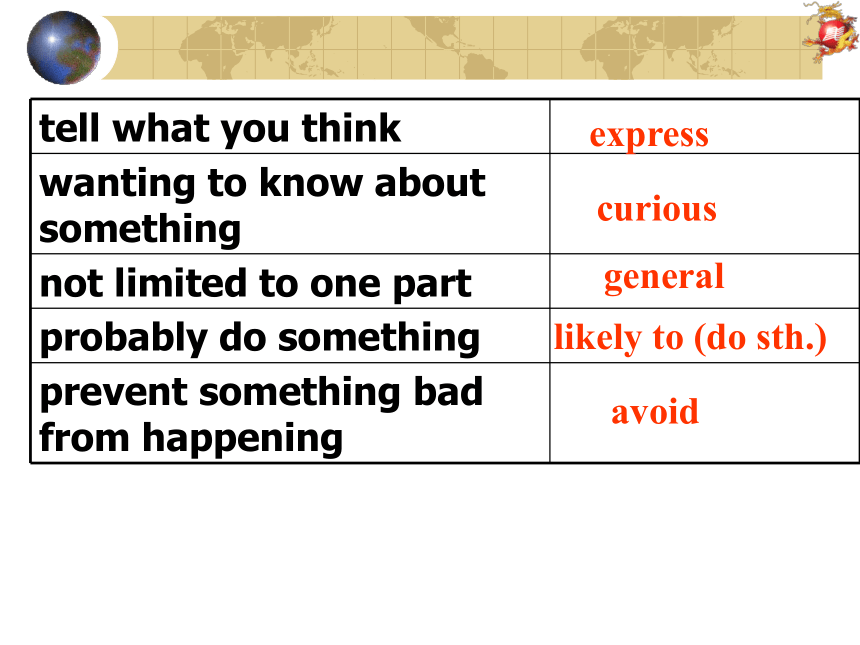
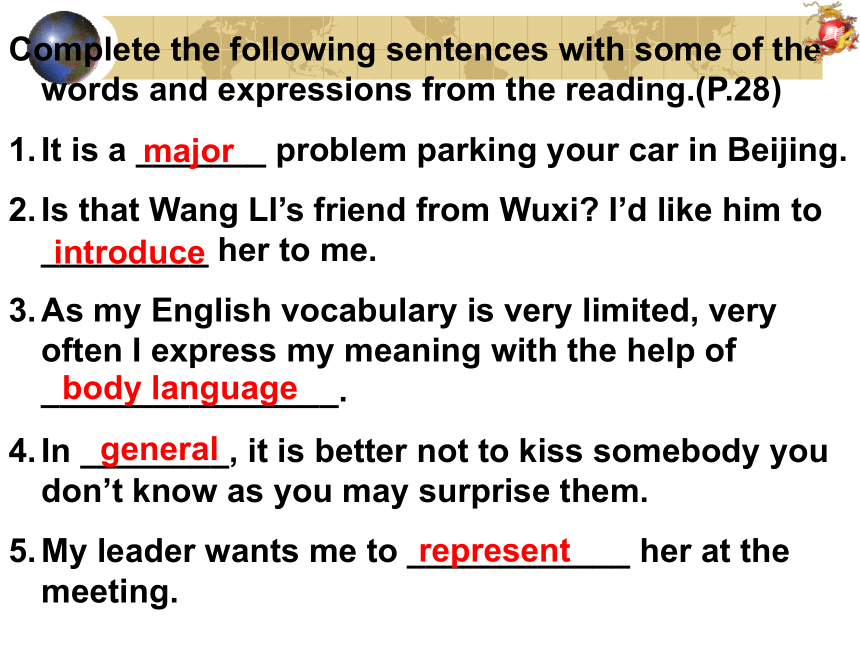
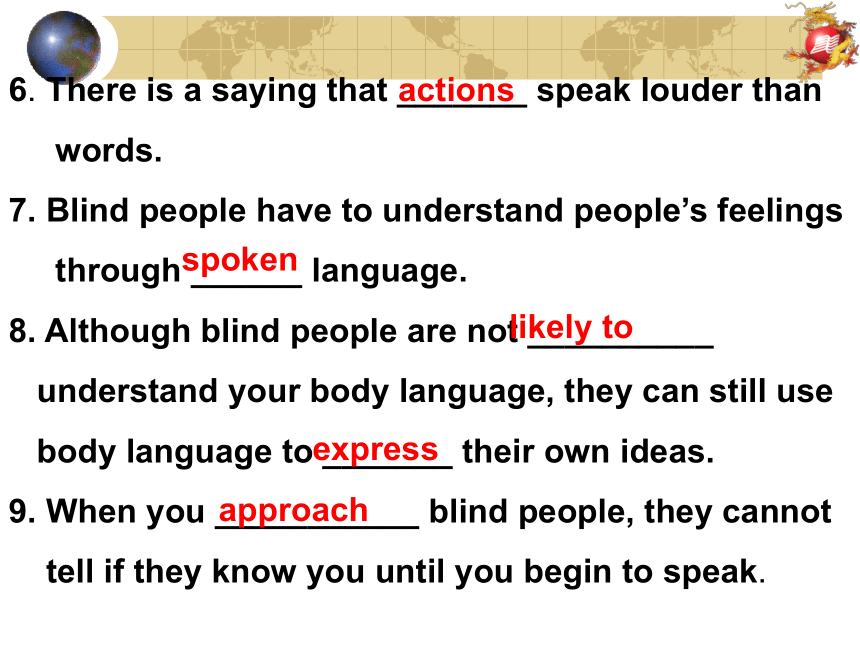
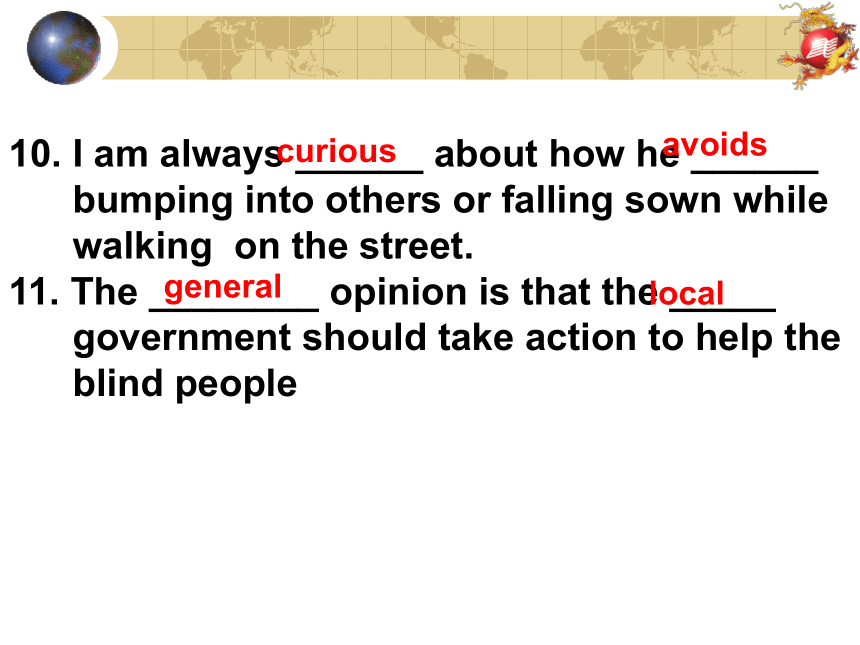
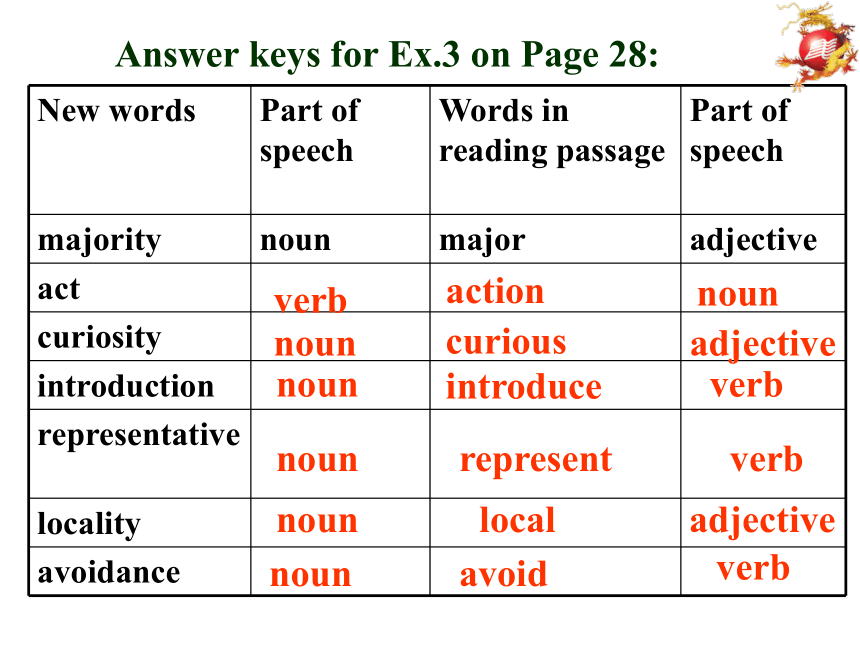
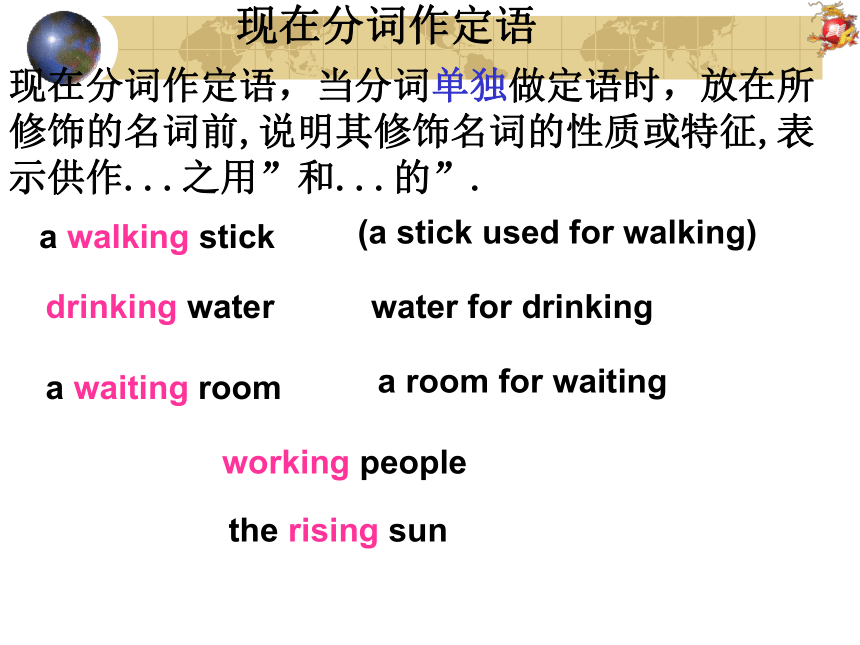
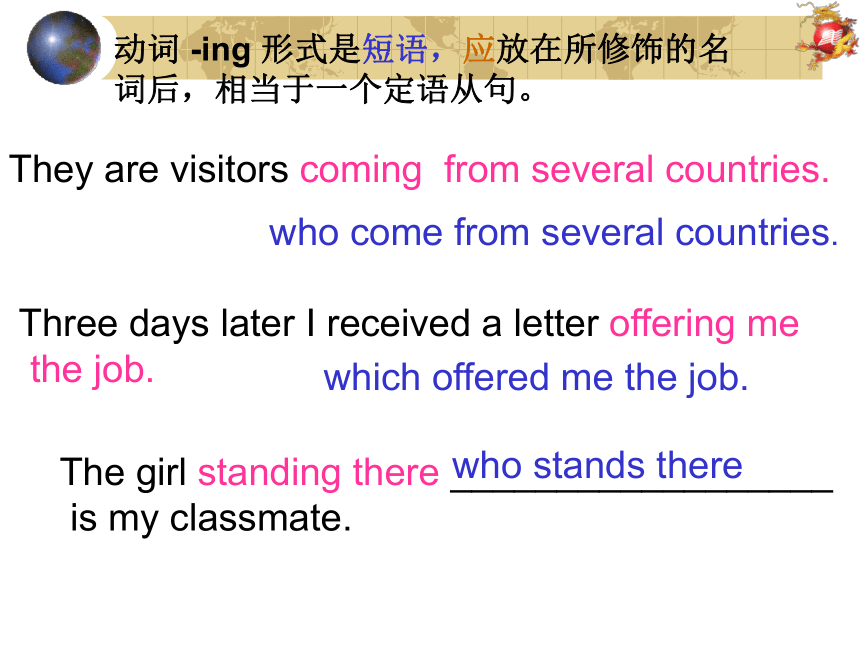
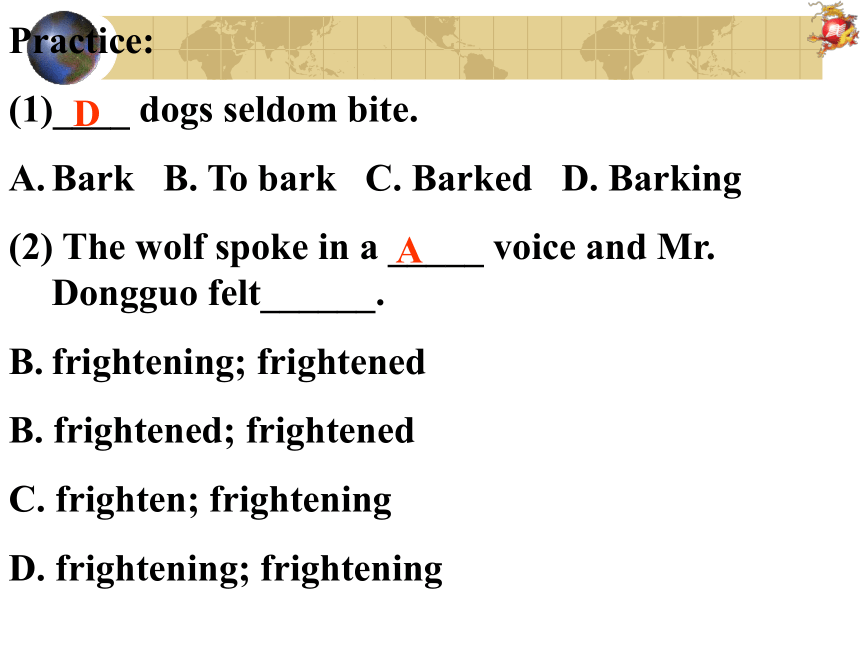
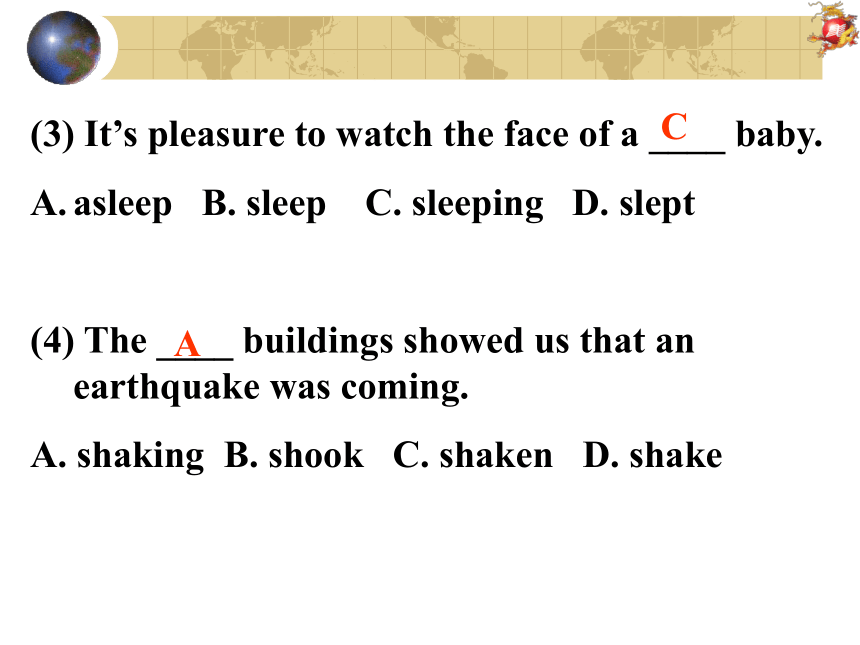
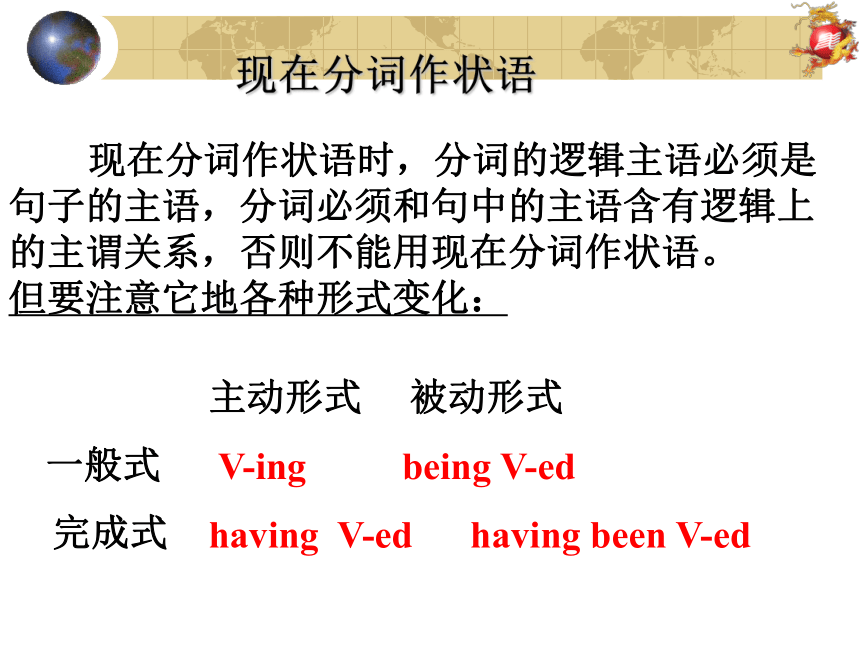
文档简介
(共36张PPT)
Answer keys for Ex.1 on Page 27:
Alternative expressions Words and expressions from the text
a particular area in which you live
speak or act for another person or group
move nearer to someone
very large or important
local (area)
major
approach
represent
tell what you think
wanting to know about something
not limited to one part
probably do something
prevent something bad from happening
avoid
likely to (do sth.)
general
curious
express
Complete the following sentences with some of the words and expressions from the reading.(P.28)
It is a _______ problem parking your car in Beijing.
Is that Wang LI’s friend from Wuxi I’d like him to _________ her to me.
As my English vocabulary is very limited, very often I express my meaning with the help of ________________.
In ________, it is better not to kiss somebody you don’t know as you may surprise them.
My leader wants me to ____________ her at the meeting.
major
introduce
body language
general
represent
6. There is a saying that _______ speak louder than
words.
7. Blind people have to understand people’s feelings
through ______ language.
8. Although blind people are not __________
understand your body language, they can still use
body language to _______ their own ideas.
9. When you ___________ blind people, they cannot
tell if they know you until you begin to speak.
actions
spoken
likely to
express
approach
10. I am always ______ about how he ______
bumping into others or falling sown while
walking on the street.
11. The ________ opinion is that the _____
government should take action to help the
blind people
curious
avoids
general
local
Answer keys for Ex.3 on Page 28:
New words Part of speech Words in reading passage Part of speech
majority noun major adjective
act
curiosity
introduction
representative
locality
avoidance
verb
noun
action
noun
adjective
curious
noun
noun
noun
noun
introduce
represent
local
avoid
verb
verb
adjective
verb
现在分词作定语,当分词单独做定语时,放在所修饰的名词前,说明其修饰名词的性质或特征,表示供作...之用”和...的”.
现在分词作定语
a walking stick
(a stick used for walking)
drinking water
water for drinking
a waiting room
a room for waiting
working people
the rising sun
动词 -ing 形式是短语,应放在所修饰的名词后,相当于一个定语从句。
They are visitors coming from several countries.
who come from several countries.
Three days later I received a letter offering me
the job.
which offered me the job.
The girl standing there __________________
is my classmate.
who stands there
Practice:
____ dogs seldom bite.
Bark B. To bark C. Barked D. Barking
(2) The wolf spoke in a _____ voice and Mr. Dongguo felt______.
frightening; frightened
B. frightened; frightened
C. frighten; frightening
D. frightening; frightening
D
A
(3) It’s pleasure to watch the face of a ____ baby.
asleep B. sleep C. sleeping D. slept
(4) The ____ buildings showed us that an earthquake was coming.
A. shaking B. shook C. shaken D. shake
C
A
现在分词作状语
现在分词作状语时,分词的逻辑主语必须是
句子的主语,分词必须和句中的主语含有逻辑上
的主谓关系,否则不能用现在分词作状语。
但要注意它地各种形式变化:
主动形式 被动形式
V-ing being V-ed
having V-ed having been V-ed
一般式
完成式
Eg. Hearing the bell, the students began to enter the classroom. 听见铃声,学生们开始走进教室。(听见和进入两个动作同时发生)
The building being built now is our new library. 现在正在建造地 这栋楼房室我们地 新图书馆(being built为现在分词的被动形式,表示动作正在进行之中。)
Having done the work, he went home. 完成了工作,他就回家了。
现在分词作状语
现在分词在句中作状语,修饰谓语动词或整个句子,表示动作发生的原因、时间、方式、结果、条件、伴随状况等。现在分词一般不用作表目的地状语(通常用不定式表目的地状语)。
Walking in the street, I came across an old friend of mine.
(=When I was walking in the street, I came across an old friend of mine.)
While waiting for the bus, he read a copy of China Daily.
(=While waiting for the bus,he read a copy of China Daily.)
1)表时间状语
2) 表原因状语
Being ill, he didn’t go to school.
(=as he was ill, he didn’t go to school.)
Being a student, you should study hard.
(=Since you are a student, you should study
hard.)
既然你是一个学生,你就应该努力学习。
由于想到它或许在家,所以我就给他打了电话。
Thinking he might be at home, I called him.
(As I thought he might be at home, I called him.)
3)表方式、伴随情况的状语 :作伴随状语的分词表示的动作,必须是主语的一个 动作,或是与谓语所表示地动作(或状态)同时发生,或是对谓语表示的动词(或状态)作进一步地补充说明。
Eg. He sat on the sofa, watching TV.
(=He sat on the sofa, and watched TV.)
他们笑着谈着走进了教室。
__________________ , they went into the classroom.
他斜靠(lean)着墙站着。
He stood leaning against the wall.(=He stood
and leaned against the wall.)
Laughing and talking
4) 表结果
Eg. Her mother died in 1990, leaving her with
her younger brother.
(=Her mother died in 1990, and left her with
her younger brother.)
全国到处在传唱这首歌曲,使它成了一首最受 欢
迎地歌曲。
The song is sung all over the
country,________________________________.
making it the most popular song
5)表条件
Using your head, you will find a way.
(=If you use your head, you will find a way.)
一直往前走,你就会看到一座白色地房子。
______________, you will see a white house.
Walking ahead
(6)与逻辑主语构成独立主格:
I waiting for the bus, a bird fell on my heard.
我等汽车时,一只鸟落到我头上。
All the tickets having been sold out, they went
away disappointedly.
所有的票已经卖光了,他们失望地离开了。
Time permitting, we'll do another two exercises.
如果时间允许,我们将做另两个练习。
有时也可用with (without) +名词
(代词宾格)+分词形式
With the lights burning, he fell asleep.
他点着灯睡着了。
(7)作独立成分:
Judging from(by) his appearance, he must be
an actor.
从外表看,他一定是个演员。
Practise:
They set out ____ for the ____ boy.
searching; losing B. searching; lost
C. to search; lost D. searched; losing
(2) The student sat there, ____ what to do.
doesn’t knowing B. didn’t knowing
C. not know D. not knowing
B
D
现在分词的否定式是在一般式和完成式的前面加not (never)
(3)He sat there _____ , with his head on his hand.
and think B. thinking
C. thought D. being thought
(4) The ____ Prime Minister expressed his satisfaction with his talks, ___ that he had enjoyed his stay here.
visiting; add B. visited; adding
C. visiting; adding D. visited; added
B
C
1.The secretary worked late into the night, _____a long speech for the president.(MET91)
To prepare B. preparing C. prepared D. was preparing
2.European foot ball is played in 80 countries, ______ it the most popular sport in the world.(NMET 98)
Making B. makes C. made D. to make
B
现在分词表结果状语
A
现在分词作伴随状语
高考链接
3. “Can’t you read ” Mary said _______ to the notice. (MET93)
A. angrily pointing B. and point angrily
C. angrily point D. and angrily pointing
A
现在分词作伴随状语
4. ____ a reply, he decided to write again.(MET92)
Not receiving B. Receiving not C. Not having received D. Having not received
5.______ his telephone number, she had some difficulty getting in touch with Bill.(上海91年题)
Not knowing B. knowing not
C. Not having known D. Having not known
C
A
现在分词作原因状语,分词结构中否定词通常放在现在分词前面。
作原因状语
Answer key for Ex.1 (P.29)
Discovering useful structures:
Attribute Adverbial
His nose touched George
Cook’s moving hand. The visitor from Japan
comes in smiling.
It is an interesting study
and can help you avoid
difficulty in communica-
tion. four people enter looking
around in a curious
way.
Attribute
Adverbial
…this is an exciting
experience for you… You see her step back
appearing surprised…
…recognizes Mr Garcia’s
Smiling face… She arrives hurrying…
Answer key for Ex.2: (P.29)
A 1. approaching 2. smiling
3. shaking 4. competing
B 1. smiling 2. shaking
3. laughing 4. touching
Using structures (P.64)
Fill in the blanks with the correct forms
of the verbs in the box and then put
the sentences into Chinese.
whisper bore speak wait
enter get know be drive
learn encourage stand
1. It seemed that he avoided ________
too close to her.
2. Reading is _________ , but speaking the
language is also a kind of __________ .
3. The news that the Chinese team won the
gold medal was very ___________ .
4. It is clear that your _______ English will
greatly improve if you can practise _______
whenever you can.
getting
learning
learning
encouraging
spoken
speaking
5. I saw them ________ to each other,
obviously they do not want to be heard
by others.
6. I counted the people _______ the theatre,
and there were 547 of them.
7. The man with sun-glasses _______ next
to the car is a detective.
_______ ill, he did not take part in the
sports meeting.
whispering
entering
standing
Being
9. _________ his car around is his main
hobby.
10. __________ she has got injured, he
hurried to the hospital to see her.
11. He stayed in the ________ room for
over an hour while the girl was having
an operation.
12. I almost fell asleep when I saw that
_________ film.
Driving
Knowing
waiting
boring
Homework:
1. Recite the new words in the text.
2. Go over “Using
language”
Answer keys for Ex.1 on Page 27:
Alternative expressions Words and expressions from the text
a particular area in which you live
speak or act for another person or group
move nearer to someone
very large or important
local (area)
major
approach
represent
tell what you think
wanting to know about something
not limited to one part
probably do something
prevent something bad from happening
avoid
likely to (do sth.)
general
curious
express
Complete the following sentences with some of the words and expressions from the reading.(P.28)
It is a _______ problem parking your car in Beijing.
Is that Wang LI’s friend from Wuxi I’d like him to _________ her to me.
As my English vocabulary is very limited, very often I express my meaning with the help of ________________.
In ________, it is better not to kiss somebody you don’t know as you may surprise them.
My leader wants me to ____________ her at the meeting.
major
introduce
body language
general
represent
6. There is a saying that _______ speak louder than
words.
7. Blind people have to understand people’s feelings
through ______ language.
8. Although blind people are not __________
understand your body language, they can still use
body language to _______ their own ideas.
9. When you ___________ blind people, they cannot
tell if they know you until you begin to speak.
actions
spoken
likely to
express
approach
10. I am always ______ about how he ______
bumping into others or falling sown while
walking on the street.
11. The ________ opinion is that the _____
government should take action to help the
blind people
curious
avoids
general
local
Answer keys for Ex.3 on Page 28:
New words Part of speech Words in reading passage Part of speech
majority noun major adjective
act
curiosity
introduction
representative
locality
avoidance
verb
noun
action
noun
adjective
curious
noun
noun
noun
noun
introduce
represent
local
avoid
verb
verb
adjective
verb
现在分词作定语,当分词单独做定语时,放在所修饰的名词前,说明其修饰名词的性质或特征,表示供作...之用”和...的”.
现在分词作定语
a walking stick
(a stick used for walking)
drinking water
water for drinking
a waiting room
a room for waiting
working people
the rising sun
动词 -ing 形式是短语,应放在所修饰的名词后,相当于一个定语从句。
They are visitors coming from several countries.
who come from several countries.
Three days later I received a letter offering me
the job.
which offered me the job.
The girl standing there __________________
is my classmate.
who stands there
Practice:
____ dogs seldom bite.
Bark B. To bark C. Barked D. Barking
(2) The wolf spoke in a _____ voice and Mr. Dongguo felt______.
frightening; frightened
B. frightened; frightened
C. frighten; frightening
D. frightening; frightening
D
A
(3) It’s pleasure to watch the face of a ____ baby.
asleep B. sleep C. sleeping D. slept
(4) The ____ buildings showed us that an earthquake was coming.
A. shaking B. shook C. shaken D. shake
C
A
现在分词作状语
现在分词作状语时,分词的逻辑主语必须是
句子的主语,分词必须和句中的主语含有逻辑上
的主谓关系,否则不能用现在分词作状语。
但要注意它地各种形式变化:
主动形式 被动形式
V-ing being V-ed
having V-ed having been V-ed
一般式
完成式
Eg. Hearing the bell, the students began to enter the classroom. 听见铃声,学生们开始走进教室。(听见和进入两个动作同时发生)
The building being built now is our new library. 现在正在建造地 这栋楼房室我们地 新图书馆(being built为现在分词的被动形式,表示动作正在进行之中。)
Having done the work, he went home. 完成了工作,他就回家了。
现在分词作状语
现在分词在句中作状语,修饰谓语动词或整个句子,表示动作发生的原因、时间、方式、结果、条件、伴随状况等。现在分词一般不用作表目的地状语(通常用不定式表目的地状语)。
Walking in the street, I came across an old friend of mine.
(=When I was walking in the street, I came across an old friend of mine.)
While waiting for the bus, he read a copy of China Daily.
(=While waiting for the bus,he read a copy of China Daily.)
1)表时间状语
2) 表原因状语
Being ill, he didn’t go to school.
(=as he was ill, he didn’t go to school.)
Being a student, you should study hard.
(=Since you are a student, you should study
hard.)
既然你是一个学生,你就应该努力学习。
由于想到它或许在家,所以我就给他打了电话。
Thinking he might be at home, I called him.
(As I thought he might be at home, I called him.)
3)表方式、伴随情况的状语 :作伴随状语的分词表示的动作,必须是主语的一个 动作,或是与谓语所表示地动作(或状态)同时发生,或是对谓语表示的动词(或状态)作进一步地补充说明。
Eg. He sat on the sofa, watching TV.
(=He sat on the sofa, and watched TV.)
他们笑着谈着走进了教室。
__________________ , they went into the classroom.
他斜靠(lean)着墙站着。
He stood leaning against the wall.(=He stood
and leaned against the wall.)
Laughing and talking
4) 表结果
Eg. Her mother died in 1990, leaving her with
her younger brother.
(=Her mother died in 1990, and left her with
her younger brother.)
全国到处在传唱这首歌曲,使它成了一首最受 欢
迎地歌曲。
The song is sung all over the
country,________________________________.
making it the most popular song
5)表条件
Using your head, you will find a way.
(=If you use your head, you will find a way.)
一直往前走,你就会看到一座白色地房子。
______________, you will see a white house.
Walking ahead
(6)与逻辑主语构成独立主格:
I waiting for the bus, a bird fell on my heard.
我等汽车时,一只鸟落到我头上。
All the tickets having been sold out, they went
away disappointedly.
所有的票已经卖光了,他们失望地离开了。
Time permitting, we'll do another two exercises.
如果时间允许,我们将做另两个练习。
有时也可用with (without) +名词
(代词宾格)+分词形式
With the lights burning, he fell asleep.
他点着灯睡着了。
(7)作独立成分:
Judging from(by) his appearance, he must be
an actor.
从外表看,他一定是个演员。
Practise:
They set out ____ for the ____ boy.
searching; losing B. searching; lost
C. to search; lost D. searched; losing
(2) The student sat there, ____ what to do.
doesn’t knowing B. didn’t knowing
C. not know D. not knowing
B
D
现在分词的否定式是在一般式和完成式的前面加not (never)
(3)He sat there _____ , with his head on his hand.
and think B. thinking
C. thought D. being thought
(4) The ____ Prime Minister expressed his satisfaction with his talks, ___ that he had enjoyed his stay here.
visiting; add B. visited; adding
C. visiting; adding D. visited; added
B
C
1.The secretary worked late into the night, _____a long speech for the president.(MET91)
To prepare B. preparing C. prepared D. was preparing
2.European foot ball is played in 80 countries, ______ it the most popular sport in the world.(NMET 98)
Making B. makes C. made D. to make
B
现在分词表结果状语
A
现在分词作伴随状语
高考链接
3. “Can’t you read ” Mary said _______ to the notice. (MET93)
A. angrily pointing B. and point angrily
C. angrily point D. and angrily pointing
A
现在分词作伴随状语
4. ____ a reply, he decided to write again.(MET92)
Not receiving B. Receiving not C. Not having received D. Having not received
5.______ his telephone number, she had some difficulty getting in touch with Bill.(上海91年题)
Not knowing B. knowing not
C. Not having known D. Having not known
C
A
现在分词作原因状语,分词结构中否定词通常放在现在分词前面。
作原因状语
Answer key for Ex.1 (P.29)
Discovering useful structures:
Attribute Adverbial
His nose touched George
Cook’s moving hand. The visitor from Japan
comes in smiling.
It is an interesting study
and can help you avoid
difficulty in communica-
tion. four people enter looking
around in a curious
way.
Attribute
Adverbial
…this is an exciting
experience for you… You see her step back
appearing surprised…
…recognizes Mr Garcia’s
Smiling face… She arrives hurrying…
Answer key for Ex.2: (P.29)
A 1. approaching 2. smiling
3. shaking 4. competing
B 1. smiling 2. shaking
3. laughing 4. touching
Using structures (P.64)
Fill in the blanks with the correct forms
of the verbs in the box and then put
the sentences into Chinese.
whisper bore speak wait
enter get know be drive
learn encourage stand
1. It seemed that he avoided ________
too close to her.
2. Reading is _________ , but speaking the
language is also a kind of __________ .
3. The news that the Chinese team won the
gold medal was very ___________ .
4. It is clear that your _______ English will
greatly improve if you can practise _______
whenever you can.
getting
learning
learning
encouraging
spoken
speaking
5. I saw them ________ to each other,
obviously they do not want to be heard
by others.
6. I counted the people _______ the theatre,
and there were 547 of them.
7. The man with sun-glasses _______ next
to the car is a detective.
_______ ill, he did not take part in the
sports meeting.
whispering
entering
standing
Being
9. _________ his car around is his main
hobby.
10. __________ she has got injured, he
hurried to the hospital to see her.
11. He stayed in the ________ room for
over an hour while the girl was having
an operation.
12. I almost fell asleep when I saw that
_________ film.
Driving
Knowing
waiting
boring
Homework:
1. Recite the new words in the text.
2. Go over “Using
language”
同课章节目录
